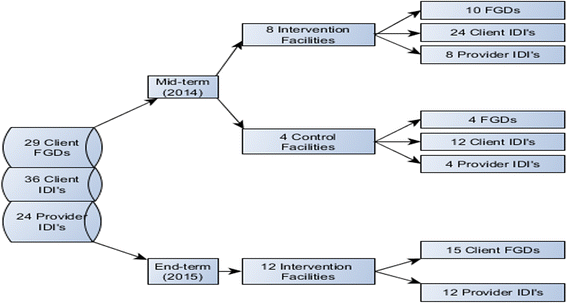Perceptions of quality across the maternal care continuum in the context of a health financing intervention: Evidence from a mixed methods study in rural Malawi
- PMID: 28595576
- PMCID: PMC5465597
- DOI: 10.1186/s12913-017-2329-6
Perceptions of quality across the maternal care continuum in the context of a health financing intervention: Evidence from a mixed methods study in rural Malawi
Abstract
Background: In 2013, Malawi with its development partners introduced a Results-Based Financing for Maternal and Newborn Health (RBF4MNH) intervention to improve the quality of maternal and newborn health-care services. Financial incentives are awarded to health facilities conditional on their performance and to women for delivering in the health facility. We assessed the effect of the RBF4MNH on quality of care from women's perspectives.
Methods: We used a mixed-method prospective sequential controlled pre- and post-test design. We conducted 3060 structured client exit interviews, 36 in-depth interviews and 29 focus group discussions (FGDs) with women and 24 in-depth interviews with health service providers between 2013 and 2015. We used difference-in-differences regression models to measure the effect of the RBF4MNH on experiences and perceived quality of care. We used qualitative data to explore the matter more in depth.
Results: We did not observe a statistically significant effect of the intervention on women's perceptions of technical care, quality of amenities and interpersonal relations. However, in the qualitative interviews, most women reported improved health service provision as a result of the intervention. RBF4MNH increased the proportion of women reporting to have received medications/treatment during childbirth. Participants in interviews expressed that drugs, equipment and supplies were readily available due to the RBF4MNH. However, women also reported instances of neglect, disrespect and verbal abuse during the process of care. Providers attributed these negative instances to an increased workload resulting from an increased number of women seeking services at RBF4MNH facilities.
Conclusion: Our qualitative findings suggest improvements in the availability of drugs and supplies due to RBF4MNH. Despite the intervention, challenges in the provision of quality care persisted, especially with regard to interpersonal relations. RBF interventions may need to consider including indicators that specifically target the provision of respectful maternity care as a means to foster providers' positive attitudes towards women in labour. In parallel, governments should consider enhancing staff and infrastructural capacity before implementing RBF.
Keywords: Conditional Cash Transfers; Demand-side financing; Malawi; Maternal care; Performance-based financing; Quality of care; Results-Based Financing.
References
-
- Atim C, Fleisher LK, Hatt L, Musau S, Arur A. Health Financing in Africa Today: Challenges and Opportunities. Washington, DC: Africa’s Health in 2010, Academy for Educational Development, and Bethesda: Health Systems 20/20 Project, Abt Associates Inc.; 2008.
MeSH terms
LinkOut - more resources
Full Text Sources
Other Literature Sources


